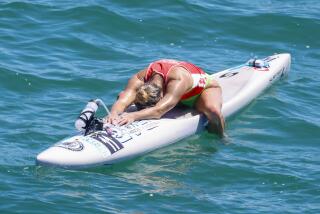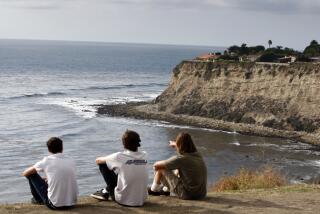San Diego Sailing Officials Weighing Options : Sticky Issues Arise Over Possibility of Appealing America’s Cup Court Ruling
- Share via
SAN DIEGO — Before a court ruling awarded the America’s Cup to New Zealand, Cup organizers in San Diego had been pressuring New Zealand yachtsman Michael Fay to forgo an appeal if he lost.
But because San Diego organizers lost, the appearance of hypocrisy is now among the factors being considered as the San Diego Yacht Club and the America’s Cup Organizing Committee debate how best to respond to the stunning ruling by New York Supreme Court Justice Carmen Ciparick.
In an unprecedented decision, Ciparick nullified Dennis Conner’s lopsided victory in a catamaran last September over Fay and his 132-foot sloop. She said the race off San Diego was unfair and violated the spirit of the Cup’s rules of racing, embodied in the 102-year-old Deed of Gift. She ordered the San Diego Yacht Club, which is the Cup’s trustee, to turn over sailing’s most coveted trophy to New Zealand.
Although a decision on whether San Diego will appeal Ciparick’s decision or agree to forfeit the Cup is unlikely to be made until sometime next week, the dynamics involved in that decision are beginning to emerge.
And while concern over hypocrisy is expected to play a role, two other competing interests are expected to dominate, according to sources within the yacht club’s board of directors and on the America’s Cup Organizing Committee.
The first is the attitude by some yachtsmen on the organizing committee and yacht club who are concerned “with the future of the America’s Cup 30 to 40 years from now,” in the words of one Cup official who asked not to be identified. This view holds that, despite the pain in giving up the Cup, it is best to get on with contesting the Cup on the water and not in the courtroom, considering that the appeals process could delay the next regatta until 1993.
An opposing view is held by San Diego’s political and business community, which is aghast that the billion-dollar-plus economic boost projected from the event has been lost. “The concern is we’re going to lose a lot of money . . . so let’s appeal,” said the high-ranking source.
In a television interview Wednesday while traveling in New Zealand, Conner said he was disappointed in the ruling but that he didn’t want to appeal. Asked if he favored an appeal, Conner said: “No. I think it’s high time the event moved on. I will abide by the umpire’s decision. I think the sailors want to get out on the water and race for the Cup on the water.”
But, Conner added: “I’m not the San Diego Yacht Club. I’m not the America’s Cup Organizing Committee. I haven’t spoken to anyone from San Diego. It’s up to them.”
A spokesman for Fay, Peter Debreceny, said the America’s Cup skipper, who is in New Zealand to film a commercial, was expected to drop in for a visit with Fay.
San Diego Mayor Maureen O’Conner has criticized the court ruling as politically motivated and urged the yacht club to appeal.
The 15-member ACOC board of directors will make a recommendation or provide a range of options to the San Diego Yacht Club’s board of directors, which will make the final decision, according to Tom Mitchell, the organizing committee’s spokesman. The ACOC board is composed of yachtsmen, politicians, and business and convention industry representatives.
Of concern to some members of the ACOC is the stance San Diego took with Fay before Tuesday’s ruling, and how that now reflects on the yacht club should the decision be made to appeal.
San Diego Cup organizers--directly and indirectly--had launched a quiet campaign to persuade Fay to abandon a further appeal in the event the judge ruled against him and for San Diego.
“Now it seems it’s hard to go back and argue that it was all right for us to keep him from appealing, but now we shouldn’t be held to the same standard,” said one ACOC member who asked not to be identified. “On the other hand, the court has accused us of cheating, of the yacht club and the city, even, of being cheaters, and that is hard to live with, because it’s not true.”
That, the source said, has triggered an emotional response. An appeal, if successful, would clear the yacht club’s name and restore its lost honor.
Fay could not be reached for comment Wednesday, but a source within his camp in New Zealand confirmed that pressure had been applied by the yacht club to discourage Fay from launching a further appeal. “Privately, there was significant pressure,” the source said.
In the last few months, the pressure has been more indirect, stemming mainly from foreign yachting syndicates who want to race for the Cup. “The other challenger organizations started to get nervous . . . because their programs came to a halt as this thing went on longer than anyone thought,” the source said. Publicly, Fay never wavered from his vow to appeal.
Mitchell, the ACOC spokesman, said the group will meet at 8:30 a.m. Saturday to discuss the judge’s ruling and what to do next, although he said a decision is unlikely to be made that day.
“One major item in that decision is what’s best for the future of the America’s Cup,” he said. “One more day in court may not be good for the Cup . . . (and) there is the question whether it is our obligation to fight this for the (future) of the Cup.”
Without an appeal, some officials are worried that what they call the inconsistencies in the logic behind the judge’s ruling may be left as a new legal standard in Cup racing.
There are also concerns about legal fees, and, according to a high-ranking America’s Cup official, there is the question of “do we have a chance to win. We might have the right to appeal, but we can’t do it just for our pride.” This official said the current thinking among Cup organizers is that winning an appeal “is a 50-50 proposition.”
Some San Diego Yacht Club leaders, such as public relations director Tom Wilson, said they expect a decision on whether to appeal to be made within 10 days. He said that there doesn’t appear to be any “pervasive mood at this time” among club members about what the next move should be. “There’s no way to know which way this is going to go right now,” he said.
While the Mercury Bay Boating Club of New Zealand may soon have the Cup, it doesn’t have a place to put it. In fact, the yacht club doesn’t even have a clubhouse. The club has only 60 members and its “clubhouse” is a 1956 Ford Zephyr car.
Said Fay to reporters in New Zealand: “I think first we’ll build a boat and then probably we’ll build a clubhouse.”


